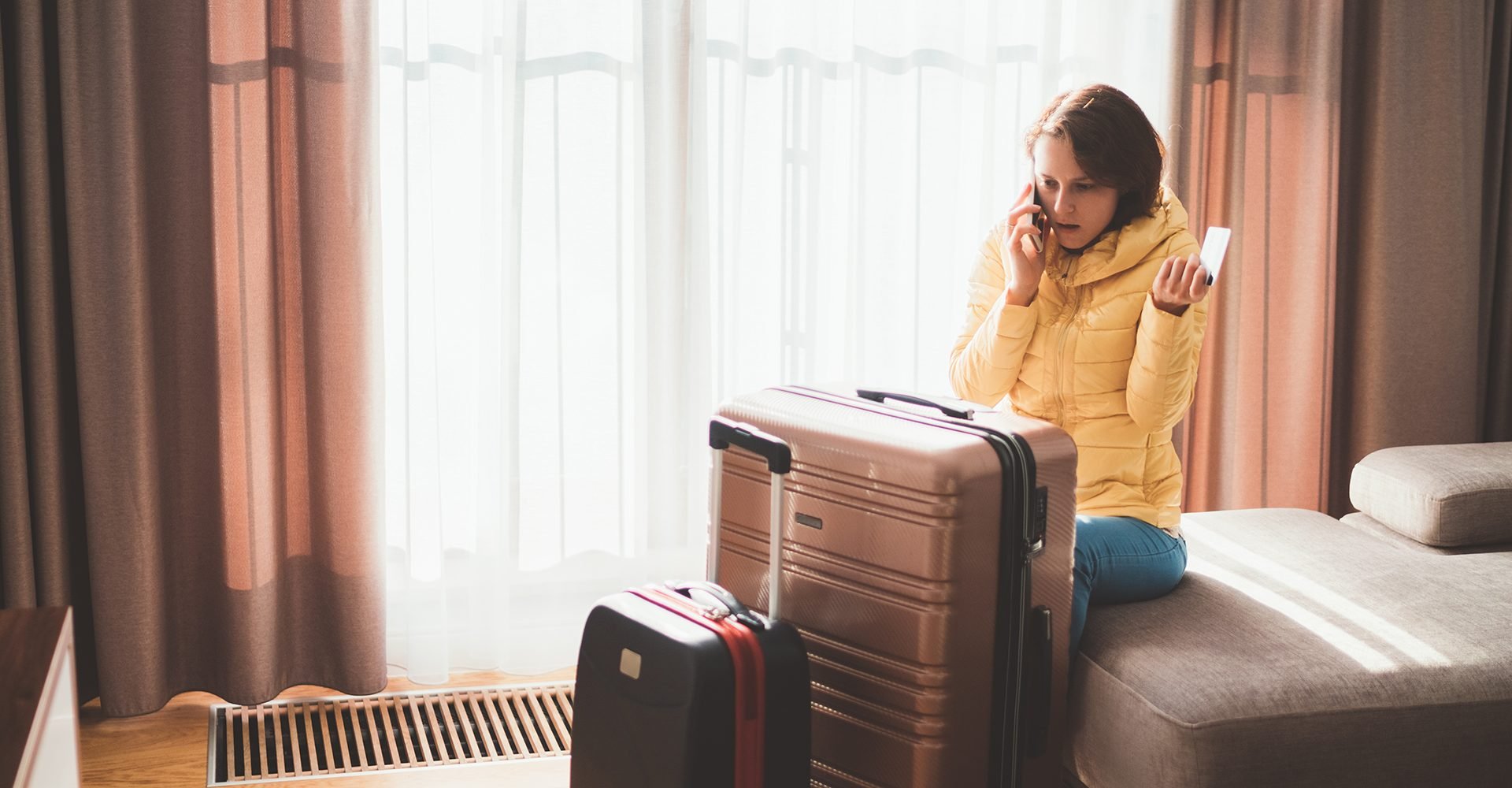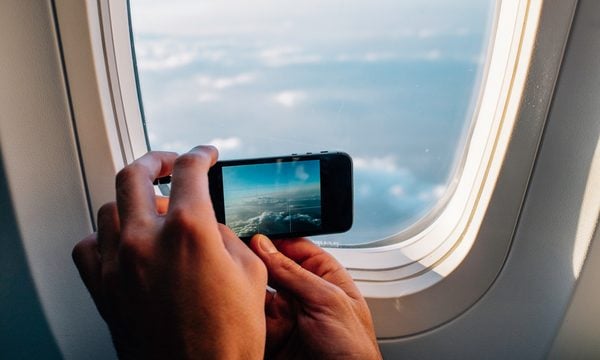The Guide to Chase Sapphire Reserve’s Travel Insurance Benefits
The Chase Sapphire Reserve's travel insurance is comprehensive and adds protection for trips booked with the card.

Many or all of the products on this page are from partners who compensate us when you click to or take an action on their website, but this does not influence our evaluations or ratings. Our opinions are our own.
The last thing anyone wants to think about when going on vacation is getting into an accident, experiencing a trip delay, or having a bag lost or stolen. However, accidents happen, and being prepared before you travel can save you a lot of headaches. If you have the Chase Sapphire Reserve®, you already have free travel insurance. Take a moment to familiarize yourself with these benefits so that you don’t unnecessarily purchase a standalone travel insurance policy.
Here’s what you need to know about the travel insurance benefits offered by the Chase Sapphire Reserve®.
Note that to benefit from the protections outlined here, your trip must have been purchased with your Chase Sapphire Reserve® or with Chase Ultimate Rewards® points earned from that card.
1. Trip cancellation/trip interruption insurance
Although these two benefits are grouped together, they are slightly different.
Trip cancellation insurance covers you before your trip begins. If a covered loss prevents you from traveling on your trip, Chase will reimburse you or your immediate family members up to $10,000. If the trip was booked using Chase Ultimate Rewards® points, reimbursement will be in the form of points.
Trip interruption insurance begins the moment your trip starts, including on the way to the point of departure or after departure. If a loss results in the interruption of your trip, this benefit offers up to $10,000 in reimbursement for cardholders and immediate family members. Reimbursable expenses include change fees as well as prepaid and nonrefundable airfare, hotels and cruises.
Valid reasons include:
- Accidental bodily injury, death or illness experienced by the cardholder, a traveling companion or an immediate family member of the cardholder.
- Extreme weather that prevents the start or continuation of a trip.
- Terrorist attack or hijacking.
- Court subpoena or jury duty that can’t be waived or postponed.
- Quarantine orders from a physician.
- Bankruptcy of the cardholder’s travel agency, tour operator or travel provider.
Chase has identified various occurrences that are not covered, such as cancellations/interruptions due to changes in plans or financial circumstances, pre-existing medical conditions, war, traveling against doctor’s orders or trips longer than 60 days.
The primary cardholder as well as immediate family members not traveling with the cardholder are also protected. The fact that Chase provides coverage to family members even if they aren’t traveling with the primary cardholder is a unique and important point.
The maximum reimbursed amount for this benefit is $10,000 per covered trip, $20,000 per occurrence and $40,000 per 12-month period. Claims must be filed within 20 days of the occurrence. In the event of a medical issue resulting in trip cancellation, cardholders must inform the trip supplier within 48 hours.
» Learn more: The majority of Americans plan to travel in 2022

By signing up, you will receive newsletters and promotional content and agree to our Terms of Use and acknowledge the data practices in our Privacy Policy. You may unsubscribe at any time.
2. Trip delay reimbursement
If your trip is delayed by more than six hours or requires an overnight hotel stay, you (and your family) are eligible for reimbursement up to $500 per person. Reimbursable expenses include meals, lodging, toiletries, medication and other personal use items.
Your trip will be covered as long as you are away from home for fewer than 365 days. Coverage is limited to one event per trip.
Covered events include:
- Equipment failure.
- Extreme weather.
- Labor strikes.
- Hijacking or skyjacking.
If a covered hazard was public or known to the cardholder before departure, reimbursement will not be provided. Coverage applies to the cardholder, a spouse or domestic partner and dependent children under age 22.
Claims must be filed within 60 days of the delay, and supporting documents must be submitted to Chase within 100 days of the delay.
» Learn more: What you need to know about Chase's trip delay insurance
3. Baggage delay insurance
If your bags are delayed by more than six hours, this benefit will cover up to $100 per day for up to five days for essential purchases like toiletries and clothing. Coverage applies to the cardholder, a spouse or domestic partner and immediate family members (even if they are not traveling with the cardholder).
There are several expenses that are specifically called out as not covered, including contact lenses, glasses or hearing aids. It’s always best to check the fine print of this policy before expecting reimbursement for your purchases.
You need to file a claim within 20 days of the delay and provide supporting documentation to Chase within 90 days of the delay.
» Learn more: Baggage insurance explained
4. Lost luggage reimbursement
Lost luggage reimbursement protects you in the event that your luggage is lost by the carrier or you incur costs to repair/replace baggage that is damaged by the carrier. Coverage is up to $3,000 per passenger and applies to the cardholder and immediate family members (even if the cardholder is not traveling on the trip).
The benefit includes a reimbursement of up to $500 per person for jewelry, watches, cameras, video recorders and other electronic equipment.
You must report the loss/damage immediately to the common carrier, and proof of the report must be included with the claim. Claims must be submitted within 20 days of the occurrence, and supporting documents need to be supplied within 90 days of the occurrence.
5. Auto rental coverage
The auto rental coverage will reimburse up to $75,000 in case of a car accident or theft when traveling within the U.S. or abroad. This benefit applies to rental periods up to 31 days.
Covered costs include:
- Physical damage/theft of the rental car.
- Towing charges to move the car to a repair shop.
- Valid loss-of-use costs incurred by the car rental company.
This coverage is primary, which means that you do not need to purchase supplemental coverage or get your own insurance company involved in case of an accident. Importantly, if you accept the collision damage waiver offered by the car rental company, you will not be eligible for this benefit.
Covered persons include the cardholder, who must be listed as the primary renter, along with additional authorized drivers added to the rental agreement.
There are many vehicles that are not eligible for coverage, including:
- Antique cars.
- Vans built to transport more than nine people.
- Motorcycles and trucks.
- Mopeds.
- Motorbikes.
- Limousines.
- Recreational vehicles.
You must contact the benefit administrator immediately to report an accident or theft, and completed claim forms must be submitted within 100 days of the damage/theft. Any remaining supporting documents must be received within 365 day of the occurrence.
6. Roadside assistance
This benefit provides various roadside assistance services while traveling within the U.S. and Canada. Cardholders are covered up to $50 per incident four times per year for the following services:
- Battery boost.
- Flat tire service.
- Fuel delivery.
- Towing.
- Lockout assistance.
Coverage applies to the cardholder driving his/her own leased or owned car. Note that coverage is not available in areas that are not regularly traveled (off-road areas) or for heavy trucks/trailers and commercial vehicles.
To use Roadside Assistance, call 1-866-860-7978. The service is available 24 hours a day, 365 days a year.
7. Travel and emergency assistance
If you’re traveling and need any sort of emergency assistance (refilling a prescription, legal referrals or translation services, to name a few), this benefit is also available 24/7. Referrals are provided free of charge, but cardholders are liable for any costs incurred for using the recommended services.
Coverage applies to the cardholder, their spouse/domestic partner and dependents under age 22.
The following services are offered:
- Emergency message service.
- Medical referral assistance.
- Legal referral assistance.
- Emergency transportation assistance.
- Emergency ticket replacement.
- Lost luggage locator service.
- Emergency translation service.
- Prescription assistance.
- Valuable document delivery arrangement.
- Pre-trip assistance (offers information on exchange rates, local currency, health precautions and ATM locations).
8. Travel accident insurance
We hope that our NerdWallet readers never have to rely on this benefit. The Chase Sapphire Reserve®’s travel accident insurance provides up to $1 million in coverage for accidental death or dismemberment and loss of speech, sight or hearing. This benefit comprises two types of insurance:
- Common carrier travel accident insurance — Applies when an accident is sustained when entering, exiting or riding as a passenger on the common carrier (airplane, train, cruise ship or bus). The maximum payout is $1,000,000.
- 24-hour travel accident insurance — Applies to any loss sustained starting on the departure date and ending on the return date. The maximum payout is $100,000.
Note that you cannot be reimbursed under both policies, and any payment received will be for the largest eligible benefit. Chase includes a list of events that are not eligible for coverage, such as:
- Illegal acts committed by the covered person.
- Emotional trauma.
- Mental or physical illness.
- War.
- Skydiving and flying on non registered aircraft.
Claims must be filed within 20 days of the occurrence, and supporting documentation needs to be provided within 90 days.
» Learn more: 4 best credit cards for travel insurance benefits
9. Emergency evacuation and transportation
If you or any member of your immediate family get sick or injured on vacation and require emergency evacuation, this benefit will cover costs up to $100,000. Examples of covered services can include ambulance transportation (air and land), medical supplies and private motor vehicles.
To be eligible for coverage, a licensed physician must approve the emergency evacuation. Furthermore, all transportation arrangements need to be made by the benefit administrator. The length of the trip must be between five and 60 days, and you must be 100 miles or farther from home.
Travel for medical treatment is not covered and neither are nonemergency services or experimental treatments.
Coverage extends to the cardholder, their spouse/domestic partner and dependent children under the age of 18 (or 25 if a full-time student at an accredited institution).
A completed claim form and supporting documentation need to be submitted within 180 days of the event.
10. Emergency medical and dental benefit
This benefit provides coverage during vacation of up to $2,500 for emergency medical or dental expenses that are not covered by your medical insurance. Cardholders are responsible for a $50 deductible.
If a physician determines that you cannot travel as a result of a medical or dental emergency, this benefit will reimburse you up to $75 per day for up to five days at a hotel. The trip must be between five and 60 days and you must be 100 miles or further from home.
Covered expenses include:
- Services of a qualified doctor, nurse, dentist or osteopath.
- Hospital/operating room costs.
- Anesthesia, X-rays or lab tests.
- Ambulance transportation.
- Medicine.
Coverage applies to the cardholder, their spouse/domestic partner and legally dependent children under the age of 18 (or 25, as long as the child is a full-time student at an accredited institution).
Chase has also outlined certain expenses that are not covered:
- Nonemergency services.
- Experimental care.
- Services in countries that the U.S. deems as unsafe for travel.
With regard to countries deemed unsafe for travel, the card's terms single out the following countries:
- Afghanistan.
- Myanmar.
- El Salvador.
- Iran.
- Iraq.
- Kampuchea (Cambodia).
- Laos.
- Lebanon.
- Nicaragua.
- North Korea.
- Vietnam.
- Yemen.
Be sure to review the U.S. Department of State's travel guidelines for your destination before deciding to rely on this coverage, as travel advisories could be applied to countries beyond those listed above.
If an emergency occurs, you must contact the benefit administrator immediately. A completed claim form and supporting documentation needs to be submitted within 180 days of the emergency.
What if coverage is insufficient?
If you don’t have a premium travel credit card that offers trip insurance or feel that the protections offered by the Chase Sapphire Reserve® are insufficient, take a look at the insurance policies offered for your state. You can either check directly with an insurer you already know or browse an insurance comparison site, like Squaremouth.
Typically insurance comparison sites offer many options to choose from, including standalone medical insurance, Cancel For Any Reason, and long-term trip insurance.
🤓 Nerdy Tip
The Nerds analyzed several factors before naming the Best Travel Insurance Companies. This can be a good first place to start understanding your coverage options. Deciding which policy is best always depends on your particular circumstances, which benefits you’d like to have and the duration of your trip.
» Learn more: How to find the best travel insurance
The bottom line
The Chase Sapphire Reserve® is a premium travel card that offers several key travel insurance benefits. Although we hope you never need to use them, it’s good to know that the coverage is there.
How to maximize your rewards
You want a travel credit card that prioritizes what’s important to you. Here are some of the best travel credit cards of 2026:
- Flexibility, point transfers and a large bonus: Chase Sapphire Preferred® Card
- No annual fee: Wells Fargo Autograph® Card
- Flat-rate travel rewards: Capital One Venture Rewards Credit Card
- Bonus travel rewards and high-end perks: Chase Sapphire Reserve®
- Luxury perks: American Express Platinum Card®
- Business travelers: Ink Business Preferred® Credit Card
Article sources
NerdWallet writers are subject matter authorities who use primary,
trustworthy sources to inform their work, including peer-reviewed
studies, government websites, academic research and interviews with
industry experts. All content is fact-checked for accuracy, timeliness
and relevance. You can learn more about NerdWallet's high
standards for journalism by reading our
editorial guidelines.
Limited Time Only: Earn $1,000 Toward Travel!
Capital One Venture Rewards Credit Card 
Travel

For a limited time, the
Capital One Venture Rewards Credit Card is offering new cardholders an especially rich bonus: Enjoy $250 to use on Capital One Travel in your first cardholder year, plus earn 75,000 bonus miles once you spend $4,000 on purchases within the first 3 months from account opening - that’s equal to $1,000 in travel!
More like this
Related articles








